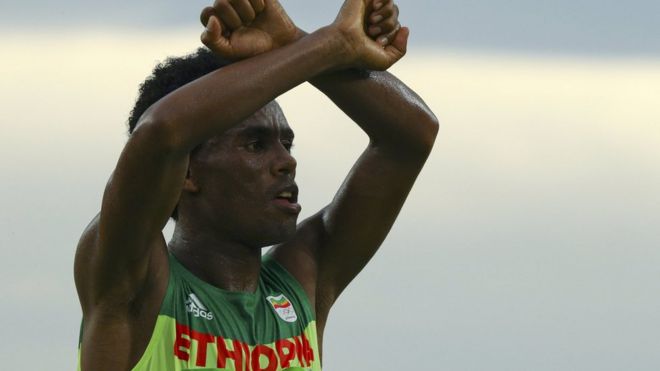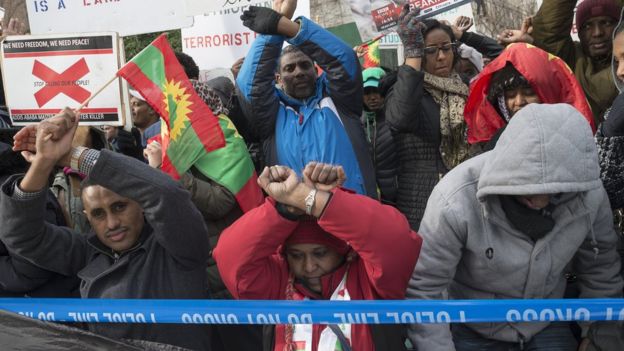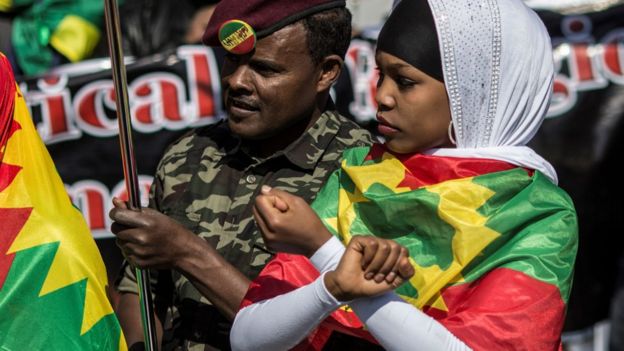
NAIROBI, Kenya — The Ethiopian marathoner who flashed an antigovernment gesture as he crossed the finish line in second place at the Rio Olympics will not go home.
The runner, Feyisa Lilesa, will not fly back to Ethiopia on Tuesday with the rest of his team, his agent said, choosing instead to remain in Brazil with his immigration status unclear.
“He didn’t plan at all for this,” said Mr. Lilesa’s agent, Federico Rosa, speaking by telephone from Brescia, Italy. "He doesn’t want to go to Ethiopia, he wants to go to another country. The U.S. would be very good but right now we just don’t know where he’s going to go. He was very happy after winning but also a bit confused.”
By raising his arms and crossing them in an X in front of his face as he crossed the finish line Sunday, Mr. Lilesa, 26, has crossed the Ethiopian government, one of the most repressive in Africa.
His gesture, which he repeated during an award ceremony on Sunday after the race, was the most visible in a growing wave of protests in recent months against Ethiopia’s government. This unusual burst of protests has erupted across Ethiopia, especially in Oromia, the region from which Mr. Lilesa hails, and where the gesture of raised arms crossed in front of one’s face has become a sign of defiance.
Tens of thousands of protesters have been jailed and hundreds have been killed, according to Human Rights Watch. Mr. Lilesa said in interviews after his race that he believed that if he were to return home, he, too, would be punished. The Ethiopian government has said he has nothing to worry about and that he would be treated like a hero upon his return.
Violent Protests in Ethiopia
Demonstrators demanding political change in Ethiopia have been met with violent resistance by the government. Witnesses say that scores of protesters have been fatally shot during clashes with police.
By Neeti Upadhye on August 12, 2016. Photo by Tiksa Negeri/Reuters. Watch in Times Video »Mr. Rosa said that Mr. Lilesa was a serious young man who “doesn’t like to play games.”
Some sports analysts have speculated that Mr. Lilesa, who finished the Olympic marathon in 2:09:54, and has one of the 50 fastest times in history, might chose to run for another country, such as Bahrain or Qatar. The Gulf states have wooed many other African-born athletes with promises of large pay days if they win international competitions.
Mr. Rosa said that Mr. Lilesa, who won the Tokyo marathon this year and has a contract with Nike, did not make his protest in an effort to cash in.
“He didn’t plan at all to go to another country,” Mr. Rosa said. “I don’t know even when he decided to do this. He didn’t say anything to me about it. I was surprised. And you don’t do something like this for money. He did this to defend his country.”
In an interview with journalists Sunday in Rio after his race, Mr. Lilesa saidhe did not discuss his protest beforehand with his agent, coaches, teammates or his family. His wife and two children remain in Ethiopia.
If Mr. Lilesa wants to apply for asylum in the United States, it would be difficult to do that while in Brazil. He might first have to get asylum in Brazil and then apply to the American authorities for so-called humanitarian parole. Under that program, which is used sparingly, often for people in danger, Mr. Lilesa would be allowed to travel to the United States and stay temporarily. Once on American soil, he could apply for political asylum.
Mr. Lilesa has became a sensation on social media. As of Tuesday night, nearly $100,000 had been raised for him via a crowdsourcing website. “We assure you all the money collected will go to support this Oromo/Ethiopian hero,” the site said.
Correction: August 23, 2016
Because of an editing error, an earlier version of this article misstated when Feyisa Lilesa made his second protest gesture. It was at a separate awards ceremony after the men’s marathon, not the medals ceremony.








